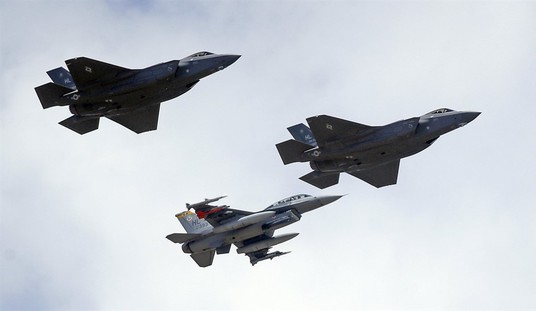
Yesterday, the story of when and if the US will withdraw from Iraq blazed up in a big way. In mid-afternoon, Reuters ran this story
U.S.-led coalition tells Iraqi military it will withdraw from Iraq out of respect for the nation's sovereignty pic.twitter.com/SaQJgbaGgD
— Reuters (@Reuters) January 6, 2020
It was based on an unsigned letter that emanated from the office of the Iranian stooge who recently resigned as Iraq’s prime minister. The letter seemed to say that a US withdrawal from Iraq had begun in response to the non-binding resolution passed by the Iraqi parliament over the weekend. There was a lot of head scratching with both Defense Secretary Mark Esper and Joint Chiefs of Staff Chairman General Mark Milley both disavowing any knowledge. Eventually, the Defense Department said that the letter was a “draft” that had been “circulated” and never should have been released. See my colleague Bonchie’s story No, Trump Is Not Withdrawing From Iraq, but How Did a Letter Stating Such Get Released?.
There are a lot of moving parts here.
The letter was leaked from the office of the Iraqi prime minister who acts like he’s on Tehran’s payroll.
Nearly simultaneously, an Arabic translation of the letter appeared in the possession of an Iraqi television station that is an Iranian asset.
Discrepancy in US military translation. In English, letter says "we respect your sovereign decision to order our departure" (to order, future). In Arabic, it says "sovereign decision that ordered our departure" (ordered, past). #Go_Figure #Iraq pic.twitter.com/IPaNjUfXbR
— Hussain Abdul-Hussain 🇺🇸 (@hahussain) January 6, 2020
To me, the letter doesn’t read much like an official letter that would have made it through any staffing process.
The letter ended up in the hands of a very Iran sympathetic journalist.
No attempt was made to validate it before it hit Twitter and the Reuters wire.
The Operation Inherent Resolve (OIR) headquarters was silent about it. Finally, the Defense Secretary had to admit that he, too, was befuddled.
Steve Hayes, writing at the internet newsletter run by Jonah Goldberg and David French, adds this:
On Capitol Hill, lawmakers and staff seeking clarity on the letter reached out to contacts in the Trump administration. At 3:46 p.m., Annie Dreazen, a staffer in the Pentagon policy office, responded to an email inquiry from the House Armed Service Committee, writing that she’d consulted advisers with Operation Inherent Resolve (OIR), the name of the task force charged with fighting ISIS in Iraq and Syria. She, too, had big news: The letter that had captured the attention of Washington, D.C., was phony and likely part of an effort to sow information chaos.
“OIR has confirmed with us at the working level that this is active disinformation,” Dreazen wrote, noting that the Pentagon was “fairly certain that this is a fake.” It’d be a big deal if the letter had been fabricated by Iran or another malign actor and humiliating if the U.S. fell for such misdirection. And this assessment suggests some OIR officials believed the prospect of a U.S. withdrawal was so problematic that America’s enemies had an incentive to create an information operation around that possibility. As word began to circulate on Capitol Hill, Mark Esper, the secretary of defense, and Gen. Mark Milley, chairman of the Joint Chiefs of Staff, met with reporters.
They didn’t declare the letter a fake but they couldn’t offer much of an explanation of its provenance or meaning, either. Esper pleaded ignorance. “I don’t know what that letter is,” he said. “We’re trying to find out where that’s coming from, what that is. But there has been no decision made to leave Iraq, period.” He declined to confirm its authenticity. “No, I can’t.”
Gen. Milley couldn’t verify that the letter was real, either. “I do know that it’s not signed,” he said. “But I just looked at it right there; it’s not signed.”
If neither of America’s top military officials could speak to the letter’s authenticity, they both downplayed claims that the U.S. was leaving Iraq. “With regard to that letter, which I’ve read once, I can’t tell you the veracity of that letter, and I can tell you what I read,” said Esper, shortly before ending the press availability. “That letter is inconsistent with where we are right now.”
A few minutes later, Milley returned and announced that the whole thing had been a screw-up. “It was an honest mistake,” Milley explained. “That letter is a draft, it was a mistake, it was unsigned, it should not have been released.”
To be charitable, none of this makes sense beyond the explanation by OIR that it was a hostile information operation.
The letter reads like it is an English translation of a document in another language, like the Arabic version of the letter is the original.
There are no prominent “DRAFT” markings on the letter and no classification. My gut is that given the political sensitivity and operational issues that a draft letter would have been (at least) SECRET/NOFORN (the NOFORN meaning that no dissemination to non-Americans is authorized). There is literally no reason why a draft memo like this would be sent to a semi-hostile foreign government before any orders had been issued by the Defense Department.
Having worked on a high level staff, I don’t find it particularly credible that a vote by the Iraqi parliament on Sunday would have resulted in a draft memo circulated to the Iraqis by Monday…or even circulated on the staff for concurrence. It is pretty difficult to imagine the OIR staff drafting anything without DOD and CENTCOM guidance and that has not been issued.
The general reaction of any bureaucracy when confronted with an imminent disaster is to NOT plan for it rather than plan too early. The impulse is to strictly compartmentalize bad information rather than spread it. I was on the Army Staff and involved in a major Reduction in Force of the officer corps (sorry, my brothers, it was business, not personal). We were forbidden to have meetings on the subject or make draft plans because ‘if we plan for it Congress will think it is acceptable to us and we’ll have to do it.’ I can’t imagine OIR jumping the gun on planning to evacuate the country. Rather just the opposite.
A two-star setting out the terms of winding down US presence in Iraq without bothering to tell literally anyone in his chain of command is an extremely poor evolutionary strategy and nearly anyone who has made it to two-stars has finely tuned survival instincts.
A draft letter to a foreign government on this subject would have been one of the last pieces of a withdrawal plan. It would only be drafted after the operational details had some clarity.
One can never rule out abject stupidity but the cosmic nature of this particular piece of stupidity, if that is to be the verdict, beggars the imagination. Could it have been someone overly zealous? It’s always possible. Though by the time you get a billet on a major staff you learn not to put your zealotry in writing. If this was an instance of a draft letter on the US withdrawal not only being hurriedly drafted but the drafts not being controlled, then it calls into question the competence of literally everyone assigned to OIR, from the commander down. And there needs to be a total purge of that organization.
As Bonchie says, cui bono, who benefits? The obvious beneficiary is Iran. The Iraqi parliament does Iran’s bidding. Then Trump says we aren’t going anywhere. Iran looks powerless. Then this letter emerges that purports to say a movement is imminent and Iran again looks like it is calling the shots. Given the totality of events, I think the OIR explanation is the correct one, that this was a hostile Iranian information operation.
Then the question becomes why would DOD eventually take responsibility? Quite possibly because there was little cost to saying it was a draft, as this would make the Iraqis happier than saying ‘not going to happen,’ and still not making any firm commitment to withdrawal. And because admitting that the entire US government had been jerked around by a rather low level information operation would have asked more questions that no one wanted to answer.
The unanswered question is why Reuters moved this letter on its wire service without any attempt at due diligence. Maybe because it was a day ending in ‘y.’














Join the conversation as a VIP Member